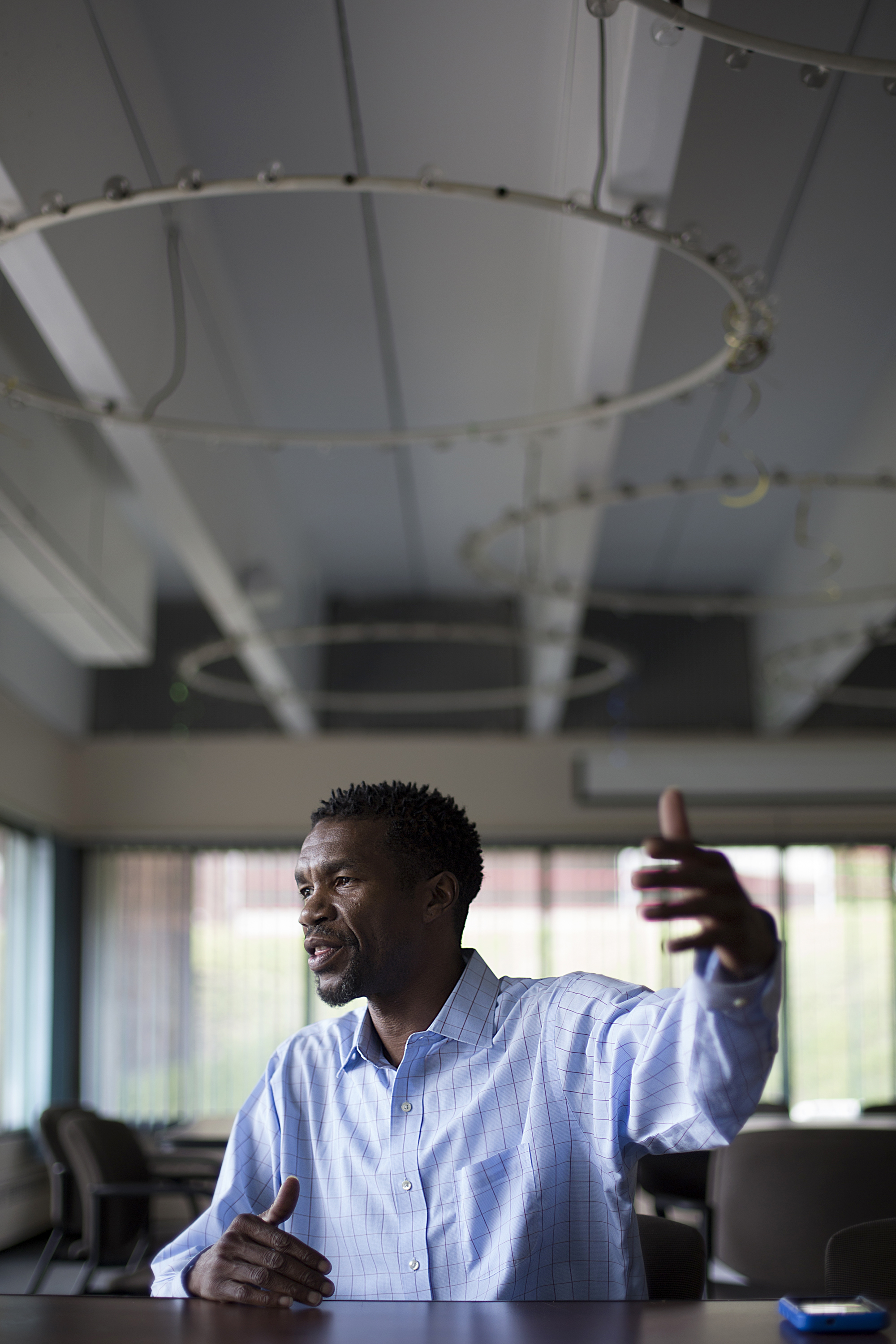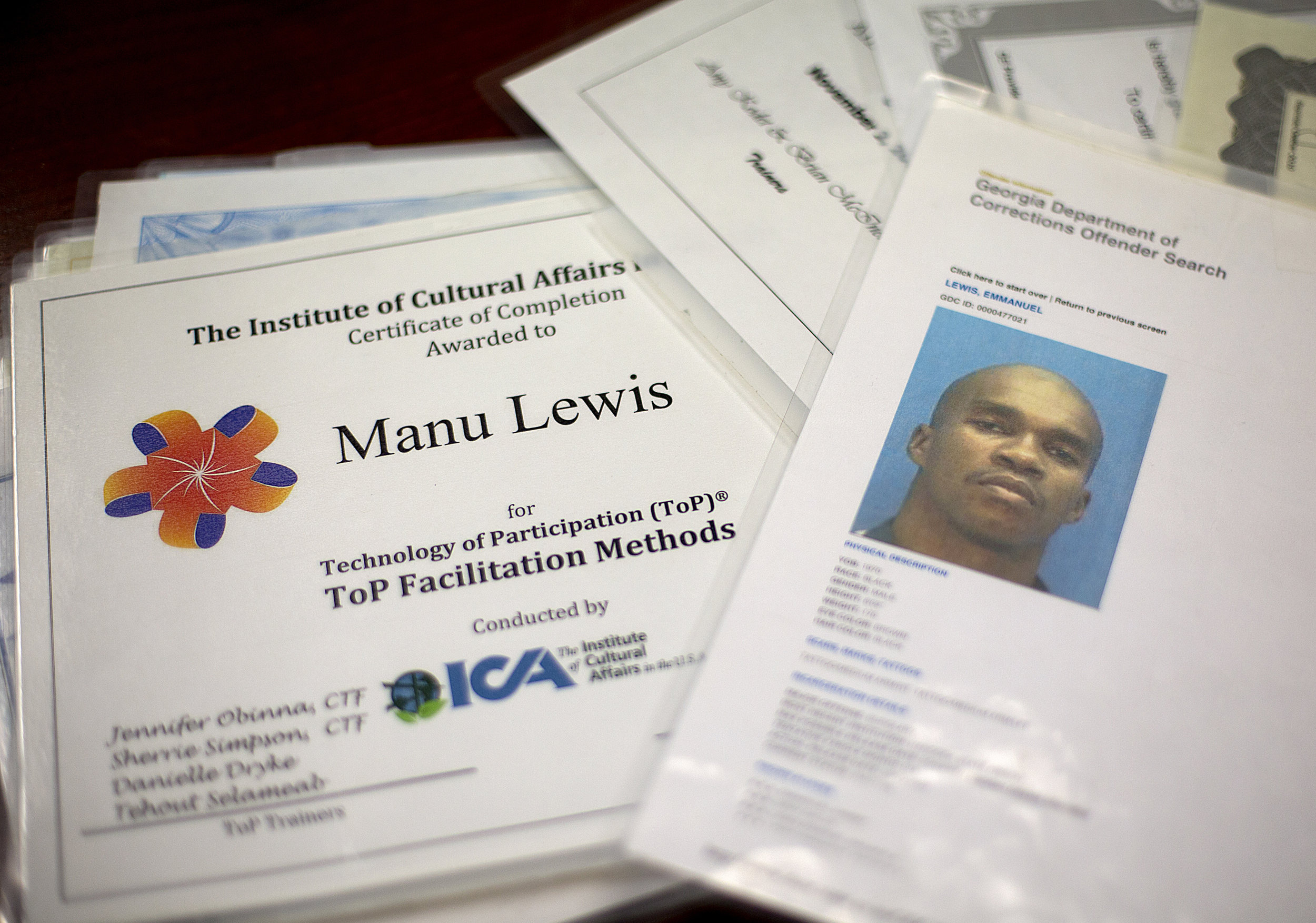Neighbors: Men's advocate Manu Lewis lives on the frontlines of community pain.
When Manu Lewis’ works with new clients at NorthPoint Health and Wellness, he shows them a laminated copy of his criminal record. Then he shows them an even thicker stack of documents: all the awards and certifications he has received since making a lifestyle change in 2010.
The catalyst for his shift was his cousin’s death, a homicide that took place on Lewis’ 40th birthday. His grief and regret opened his eyes to other possibilities. Prior to that he had been repeatedly incarcerated. He had experienced deep pain and many deaths. He realized how much healing he had to do.
Though he’s made dramatic changes in his life, and he works as an advocate for others trying to do the same, his days are still filled with trauma – "generational, historical, personal, and perceived.” He is a "soul medic" for the Department of Health. He does Gang Violence Intervention work, and he is also a community engagement expert for the Minneapolis Police Department.
This month he spoke with North News about trauma – how it manifests in violence, how we live with it, and how we begin to heal from it.
By Daija Triplett | Photos by David Pierini
What is trauma to you? I define trauma as unexpected situations and circumstances that happen too often, too much, and too fast to process. There is generational trauma which is historic, and personal trauma which happens to us directly. We feel it down in the marrow of our bones. When trauma is not dealt with or addressed, the experience takes on another life inside a person.
Lewis shows his clients evidence of his past mistakes (his criminal record) and his efforts to continue his education through certificates and trainings.
You are a “soul medic” and counselor. How did you start working with people who experience trauma? On Jan 20, 2010, my cousin was murdered on my 40th birthday. I decided to make a lifestyle change. Seven days later I started to co-facilitate a twelve step self-help recovery program called Criminals and Gang Members Anonymous. I facilitated that particular group for five years. After the tornado, I started working at the Neighborhood Hub. I realized I had more trauma to work on.
How does the Northside community experience trauma? My mother always tells me about how from the apartment that they lived in on Sheridan where I was born, she was able to look right down Plymouth and see the riots. The riots were not the start of trauma in our community but they were a defining moment where a lot of the social norms changed. North Minneapolis experiences a high range of traumatic incidences based on the culture. The low end of North Minneapolis was designated as a negro slum. Then you have the political landscape where certain resources and opportunities aren’t provided to the community. I think North Minneapolis has been and continues to be traumatized in a lot of identifiable ways and a lot of other ways that are very subtle.
How do you think people should cope with their trauma? Everyone has different coping mechanisms, but some people don’t cope with trauma. First, [it’s important] to recognize exactly some of the things that have happened. I share with a lot of my guys that it’s not their fault. Certain things have not happened to them because they are defective. I try to shine a different light if possible on the things that have happened and find other means to engage in life.
Manu Lewis sits in his office at NorthPoint Health and Wellness Center. He has worked there for three years.
If people have different ways of coping, what is your starting point with a person who has experienced trauma? First to identify and recognize the situation in reality. There has never been anyone born who didn’t pass away. How people pass away and how we receive their passing is totally different. I have experienced a high volume of deaths in my family and friends circle. I may see and experience someone passing now differently than someone who hasn’t lost anyone. It’s not new to me. First I start with recognizing my feelings and my response. Then I find some alternate solutions to internalizing them where they fester. We lost four individuals [in the community in one weekend last month]. It was traumatic to the community, but everybody responded differently. We have some people saying we should be in a state of emergency right now.
Do you think there are enough trauma-related resources in our community? No. Trauma-informed care has become a cliché, sexy, romantic term. A lot of money is being said to go toward helping individuals with trauma, but most of that money really in all actuality does not meet the people and is not supportive of the people unless you’re doing direct service with them.
How do we stop violence in our community? Be engaged. Talk to people. My nephew used to say “sharing is caring.” Violence is a symptom of something else. When you lack resources and opportunities and you’re marginalized people, those same individuals will take it upon themselves to create a new culture – whether it’s robbing, stealing, or selling dope, it doesn’t matter. What I do with a lot of young men is apologize. I apologize for taking part in a destructive lifestyle that they inherited. These young men have images of us and what we do and then they take it to the next level. I apologize for being a negative influence.
How do we guide our youth to avoid the violence that has unfolding in north Minneapolis? Open communication. Asking. Being attentive to our young people, especially the ones going through things. I know we should listen more to youth. A lot of the answers we’re looking for come from [them].
How can police and youth develop better relationships with each other? One of the most important things you can do with the youth is engage them. Most of our youth, they see the uniform, not a human being. How police engage makes them a human being. Yesterday I was driving down Penn. There was this lady officer; she was playing basketball with some young men. That engagement can stop a lot. It’s those small interactions that have a culturally rippling effect on the community.
Who inspires you to keep going? In '87 when I got locked up, there was a sheriff who helped me get my GED. He told me education was free and never to stop learning. He was a white dude who showed me I could keep going. Since 2010, I have acquired at least 35 certificates and trainings.
How do you deal with your trauma day to day? Self care is mandatory, especially for people working with people through trauma. Trauma is transferable. It’s very important to have self care so we can stay healthy. I like getting outside and riding around the lakes. I’m an Aquarius; I have to be around water. Change is inevitable. Yesterday we lost one of our NorthPoint coworkers to cancer. Yesterday was a doozy. Today was okay. I’m not even tripping about tomorrow.



